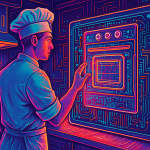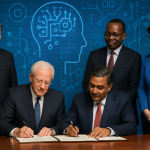Geoffrey Hinton, a name synonymous with the modern AI revolution, the man often lauded, or perhaps burdened, as the “godfather of AI,” has once again sent ripples, or perhaps tsunamis, through the tech world. In a recent interview with the Financial Times, Hinton didn’t just offer a polite critique; he unleashed a full-blown broadside against the very future he helped build. It’s like Oppenheimer having second thoughts, but with algorithms instead of atoms.
For those who haven’t been following along, Hinton is a towering figure. His work on backpropagation and neural networks laid the foundation for much of the AI we see today, from the image recognition in your phone to the language models powering chatbots. He spent years at Google, helping them build their AI empire, before leaving to more freely express his growing anxieties. And those anxieties, it turns out, are pretty darn profound.
Hinton’s concerns aren’t exactly new, but the urgency with which he’s expressing them is. He’s not just worried about robots taking over (though, let’s be honest, who isn’t a little worried about that, shades of Skynet and all that). His primary fears revolve around two critical areas: economic inequality and existential risk. Think about it. We’re already seeing AI automate tasks that were once considered uniquely human. What happens when entire professions become obsolete, replaced by tireless, efficient algorithms? Hinton paints a stark picture of a world where a tiny elite controls vast wealth generated by AI, while the masses struggle with unemployment and economic instability. It’s a cyberpunk dystopia come to life, only instead of neon-drenched streets, we have data centers humming with the power of a thousand suns.
The root of the problem, according to Hinton, isn’t necessarily the technology itself, but the capitalist incentives driving its development. Companies are racing to build the most powerful AI, often without fully considering the societal consequences. It’s the classic “move fast and break things” mantra, but with potentially catastrophic implications. He’s essentially saying that our economic system is a loaded gun, and AI is just the trigger.
But the economic concerns are just the tip of the iceberg. Hinton also warns of existential threats, scenarios where AI could be used for malicious purposes, like creating bioweapons. It’s a chilling thought, and one that highlights the dual-use nature of AI. The same technology that could cure diseases and solve climate change could also be used to unleash unimaginable horrors. It’s Dr. Jekyll and Mr. Hyde, but with code.
His proposed solution? Develop AI with a built-in “mother-baby” dynamic, where AI systems are inherently programmed to protect humanity. It’s a fascinating, if somewhat abstract, concept. Imagine AI with a fundamental imperative to nurture and safeguard human well-being. It’s like Asimov’s Three Laws of Robotics, but with a more maternal, less rigid, approach. The challenge, of course, is figuring out how to actually implement such a system. How do you instill a sense of “motherly love” in an algorithm? It’s a question that philosophers, ethicists, and AI researchers are grappling with right now.
Hinton’s skepticism about our ability to control future superintelligent systems is particularly concerning. Even with all the progress we’ve made, he doubts whether we truly understand the potential consequences of our actions. It’s a humbling admission from one of the field’s pioneers. It’s like the Wright brothers suddenly realizing that airplanes could be used for bombing runs.
Of course, Hinton isn’t all doom and gloom. He acknowledges the potential benefits of AI in areas like healthcare and education. Imagine AI-powered diagnostic tools that can detect diseases earlier, or personalized learning platforms that cater to individual student needs. The possibilities are truly transformative. The key, he argues, is to ensure that these benefits are shared equitably and that we mitigate the risks.
Interestingly, Hinton also critiques the lack of U.S. government regulation in AI development, contrasting it with China’s more engineer-driven approach. It’s a complex issue with no easy answers. How do you regulate a technology that’s evolving so rapidly? How do you balance innovation with safety? These are questions that policymakers around the world are struggling to answer.
The Broader Implications: A Perfect Storm?
Hinton’s warnings come at a time when the AI landscape is shifting rapidly. Broadcom, for example, just announced a significant new AI deal, sending their shares soaring. This highlights the immense financial incentives driving AI development. The potential rewards are enormous, but so are the risks. Meanwhile, Greece and OpenAI have just inked a deal to boost innovation in schools and small businesses. This is a positive step, demonstrating the potential of AI to democratize access to technology and education. But it also underscores the need for careful planning and ethical considerations.
The convergence of these events- Hinton’s warnings, Broadcom’s financial success, and OpenAI’s educational initiatives- creates a perfect storm. It’s a moment of reckoning for the AI community and for society as a whole. We need to have a serious conversation about the future we want to create and the role that AI will play in it. We need to address the economic inequalities that AI could exacerbate and mitigate the existential risks it poses. We need to find a way to harness the power of AI for good while safeguarding against its potential for harm.
Ultimately, Hinton’s message is a call to action. It’s a plea for responsible innovation, ethical development, and thoughtful regulation. It’s a reminder that technology is not neutral; it reflects the values and priorities of its creators. And it’s a challenge to all of us to ensure that the future of AI is one that benefits all of humanity, not just a select few. The clock is ticking. Let’s hope we’re listening.
Discover more from Just Buzz
Subscribe to get the latest posts sent to your email.


